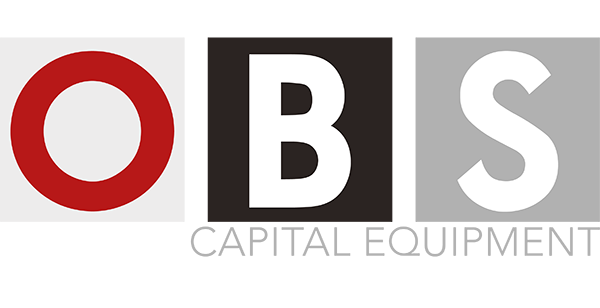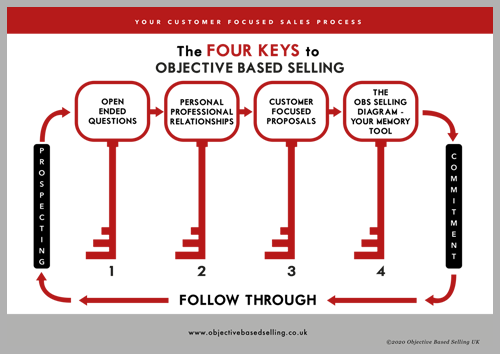The essentials of a capital equipment sales model are embodied in The Four Keys To Objective Based Selling:
- Ask open-ended questions
- Build personal, professional relationships
- Design customer-focused proposals
- Follow the Objective Based Selling diagram
KEY 1: OPEN-ENDED QUESTIONS
Asking questions, or what our industry calls “open ended questions”, that is, questions that get the customer talking, is the key to understanding a customer’s needs and objectives while helping the salesperson to:
- Prospect and qualify prospects
- Encourage the customer to talk about their company’s objectives, operational situation, purchasing procedures & criteria, decision influencers and personal objectives
- Understand the customer’s situation in order to make responsive recommendations
- Create forward motion in the sales process
- Build trust and rapport with the customer
- Perform critical sales functions for the customer
KEY 2: BUILD PERSONAL, PROFESSIONAL RELATIONSHIPS
While many forces in today’s material handling sales environment are pushing toward depersonalisation, ultimately all purchasing decisions are emotional and made by people. People are still buying from other people; even if they use computers and formal contracts to do so.
The larger the project and the more critical the purchase is to the customer, the more important it is for the material handling salesperson to establish a personal, professional relationship with the key decision influencers. These relationships provide:
- Access to other decision influencers
- Information leading to responsive recommendations which are customised to the customer’s objectives & parameters
- Opportunities to build trust
- A better understanding of the customer’s decision-making criteria and process
- Coaching for the salesperson in how to take care of the customer
- The opportunity to provide a modified, more targeted proposal at the time the customer is actually ready to act. Sometimes referred to as the “second chance”
- An early warning of the need (and the opportunity) to react, adjust and recover during the implementation phase of a project if things are not progressing as planned
Personal, professional relationships are vitally important in the sales process. When business and personal objectives are in conflict, personal objectives always win. How responsive the salesperson’s proposal is to customer objectives or how attractive the price is or how strong the salesperson’s proposal is becomes irrelevant if the customer does not like, believe, understand and trust the salesperson and his company. The customer finds a way to purchase elsewhere.
KEY 3: CUSTOMER-FOCUSED PROPOSALS
All significant material handling purchases involve a written proposal, whether paper, electronic or both, before the customer makes a commitment. Most proposals by material handling salespeople have two critical flaws:
- Primarily focusing on the equipment or service methods. In the extreme, many material handling proposals are simply a listing of equipment specifications with a quoted price and delivery statement. Not selling, just quoting.
- No reference to the customer’s objectives & parameters. As such, there is no indication that the salesperson even understands the customer’s objectives & parameters, let alone took them into consideration when creating the proposal. Without these particulars, there is no indication that acting on this proposal will enable the customer to achieve their objectives. It is merely another equipment quote, of which the lowest quote wins the order. Alternatively, the project dies due to ineffectively competing for funds.
In other words, most material handling equipment and service proposals quote rather than sell.
KEY 4: THE OBJECTIVE BASED SELLING DIAGRAM
The diagram is a visual representation of the Four Keys to OBJECTIVE BASED SELLING.
The basic concept of Objective Based Selling is that customers make material handling purchase decisions, for both business and personal reasons, to accomplish both business and personal objectives.
Consequently, the task of the material handling salesperson is to determine both the customer’s business and personal objectives. Secondly, the salesperson needs to fully reassure the customer that they can accomplish these objectives by acting on the written, customer-focused proposal.
DOWNLOAD THE FULL ARTICLE AND MORE HERE.

